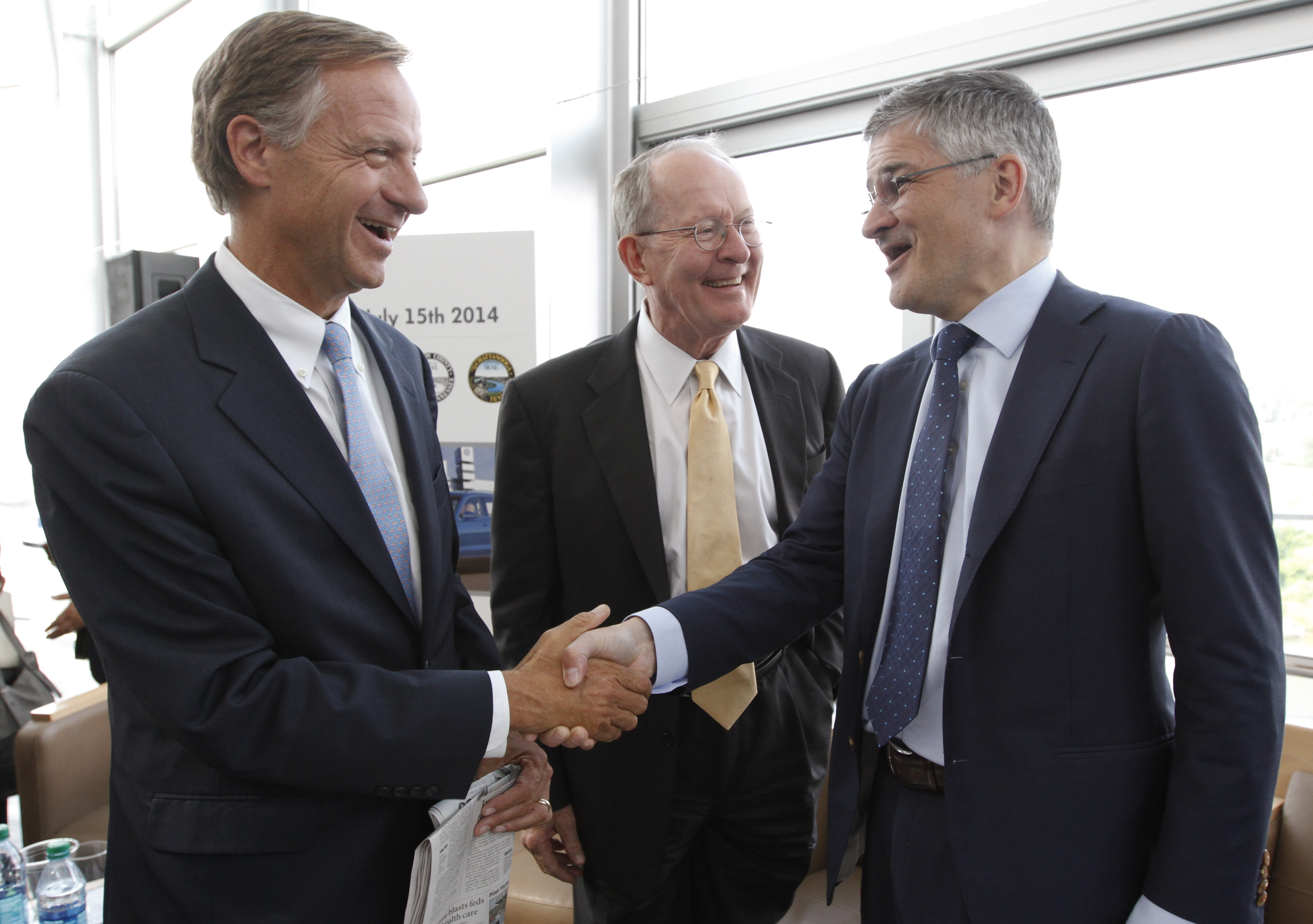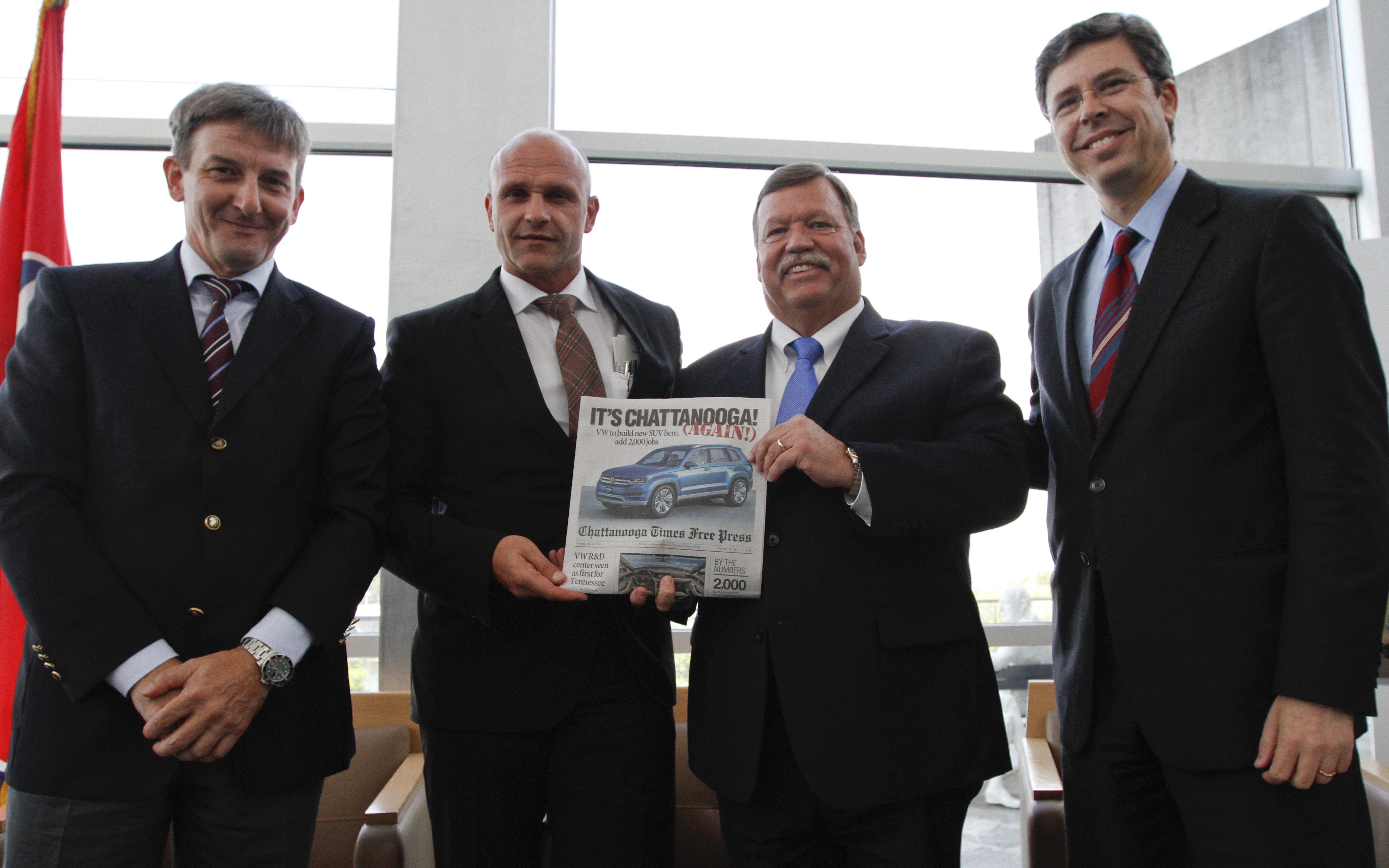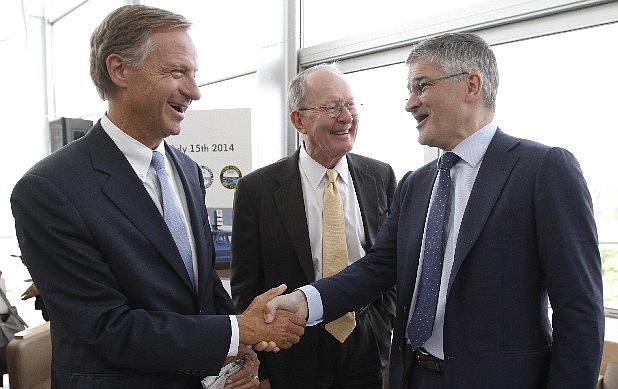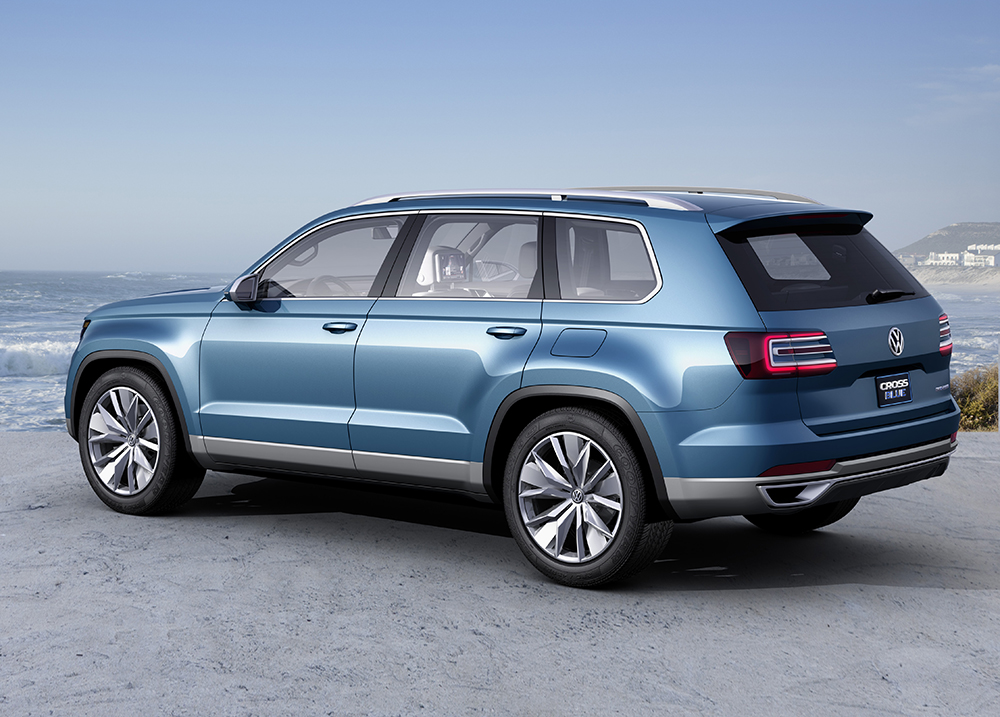READ MORE• VW official: New SUV to be produced in Chattanooga is 'a stunner' (videos)• Cook: Why VW may not matter
View our past VW SUV coverage
 Tennessee Gov. Bill Haslam, left, speaks to U.S. Sen. Lamar Alexander, center, and Michael Horne, president/CEO of Volkswagen Group of America, while at the Hunter Museum of American Art on Tuesday. The meeting was Volkswagen's local announcement that they are investing $600 million to create 2,000 new jobs and expand the Chattanooga plant where they will be producing a new sport utility vehicle.
Tennessee Gov. Bill Haslam, left, speaks to U.S. Sen. Lamar Alexander, center, and Michael Horne, president/CEO of Volkswagen Group of America, while at the Hunter Museum of American Art on Tuesday. The meeting was Volkswagen's local announcement that they are investing $600 million to create 2,000 new jobs and expand the Chattanooga plant where they will be producing a new sport utility vehicle.A deal to grow Volkswagen's Chattanooga plant by 1,350 more jobs became richer as talks progressed between the state and the automaker, which made it clear that it's eyeing much more U.S. sales than it has garnered to date.
That's how, said Tennessee Gov. Bill Haslam in Chattanooga on Tuesday, VW's expansion of its plant here ballooned to 2,000 jobs, including 200 in what he termed a first-of-its-kind auto research and development center in the South.
"As long as you're talking about expanding, let's take a bigger bite now and include the R&D piece," Haslam said negotiators told VW. "As they started talking business growth, we said 'Why not sooner than later.'"
Haslam joined with federal, state, local and VW officials at the Hunter Museum, along with more than 300 people, to mark Monday's announcement that the German automaker will build a new sport utility vehicle in Chattanooga.
The Hunter was the site, six years ago to the day, where VW made public its intention to build the Chattanooga factory and return to producing vehicles in America.
Chattanooga Mayor Andy Berke told the group at the Hunter on Tuesday that "the eyes of the world" are on the city with VW's plans to more than double its workforce to about 4,400 jobs at its plant and invest $600 million.
"This is a stake in Chattanooga's innovation future," he said.
Christian Koch, who heads VW's Chattanooga operations, said he had three words to say.
"Oh happy day!" he said, adding that the second vehicle line will greatly expand the plant's impact on Chattanooga.
U.S. Sen. Lamar Alexander, R-Tenn., said while Tennessee is the most attractive state for auto assembly and supplier companies, it hasn't been able to woo the R&D jobs.
"It's a very important next step for the auto industry in Tennessee," he said, adding that it may help attract future developments. "If it starts in Chattanooga, it may end up in Chattanooga."
U.S. Sen. Bob Corker, R-Tenn., his voice cracking with emotion at one point, thanked VW for the investment in his hometown.
"This investment is far greater than anyone anticipated," he said. "The additional 650 jobs, much of them in R&D, puts us in a very different place."
 Christian Koch, President/CEO of Volkswagen Chattanooga, Thomas Ulbrich, Volkswagen passenger car board of management member, Hamilton County Mayor Jim Coppinger and Chattanooga Mayor Andy Burke, from left, meet at the Hunter Museum of American Art on Tuesday while gathering for Volkswagen's announcement that they are investing $600 million to create 2,000 new jobs and expand the Chattanooga plant where they will be producing a new sport utility vehicle.
Christian Koch, President/CEO of Volkswagen Chattanooga, Thomas Ulbrich, Volkswagen passenger car board of management member, Hamilton County Mayor Jim Coppinger and Chattanooga Mayor Andy Burke, from left, meet at the Hunter Museum of American Art on Tuesday while gathering for Volkswagen's announcement that they are investing $600 million to create 2,000 new jobs and expand the Chattanooga plant where they will be producing a new sport utility vehicle.Corker noted that the deal to land the SUV played out more publicly than most.
The former Chattanooga mayor came out in February, during a contentious United Auto Workers election at the plant in which the union sought recognition, saying he'd been assured by VW that the SUV would be coming to Chattanooga if the UAW was defeated. The employees turned down the UAW by a vote of 712 to 626.
Corker said the UAW's appeal for a new election with the National Labor Relations Board was withdrawn on April 21. Three days later, the parties re-engaged, he said. It was June 13 that VW and the state reached "a grand bargain" over handshakes at the governor's residence, Corker said.
He said a lot has been made by some about the absence of an announcement from the time talks re-emerged in April and mid-June.
"To move us from a place of 1,350 jobs to one of 2,000, that six weeks or so was worth it," Corker said.
He said that Volkswagen as a company grew out of the years before World War II. The automaker, one of the top three in worldwide sales though lagging in America, has evolved so that it has a lot of different stakeholders and constituents, including government, the senator said.
"With what has happened over the last six months, sometimes it's confusing," Corker said.
He quipped that VW is "not unlike Congress in some ways. Sometimes people in Congress stand up and speak like they're speaking for the country when they're just speaking for themselves. That's one reason why it happened the way it did."
Haslam, too, said the deal with VW was struck five weeks ago.
"We've been waiting on a time we could go to Germany and they could go here," he said, mentioning that Tennessee officials joined VW Chief Executive Martin Winterkorn at the company's Wolfsburg headquarters for Monday's news.
Haslam said the R&D piece of the deal came together later in the negotiation process, within the past three or four months.
He said he sees not only the VW jobs, but more supplier posts as well.
"What Chattanooga needed was scale," he said, noting that the plant produces just the midsize Passat sedan. "Now there's the scale."
Hamilton County Mayor Jim Coppinger said that with the new investment, VW will have plowed about $1.5 billion into its Enterprise South industrial park plant.
He said that VW will pay education taxes valued at $1.5 million a year, boosting its total to $4.3 million annually.
Tennessee, which had offered nearly $300 million of grants, training assistance and tax credits last year to lure what was initially the earlier 1,350-job expansion, pulled the initial offer off the table at the end of January when talks stalled and workers prepared for the UAW vote.
GOP lawmakers, upset by the union's heavy Democratic support and worried about how the UAW might hurt the state's right-to-work heritage, expressed concern about granting so much assistance to VW if the plant brought more UAW presence to Tennessee.
"There was a lot of negotiating to get to this agreement and this is where we ended up," Berke said. "We are going to bring the type of innovation jobs to Chattanooga in a way that has not typically been seen here in the South. We're being trusted not only to build the car but to design the car of the future and that's a great opportunity for us."
In the end, the state and local governments, along with the Tennessee Valley Authority and its distributors, offered a total of $262.3 million of upfront grants for plant development and construction and another $12 million in training assistance for new workers that will be hired for the expansion next year.
VW agreed not to press for nearly $100 million of tax credits the company could receive over time under the state's job and industrial machinery tax credit statutes.
In all, with property tax breaks and new roads planned around the plant, VW will be aided by more than $300 million of government assistance for the planned 2,000-employee addition.
Corker cited the transformation of Chattanooga over the last 30 years. One piece the city needed was a "world-class auto manufacturer to locate" in Hamilton County, he said.
"Thank you for completing that vision," Corker said to the VW officials.
Contact Mike Pare at mpare@timesfreepress.com or 423-757-6318. Contact Dave Flessner at dflessner@timesfreepress.com or 423-7576340.

